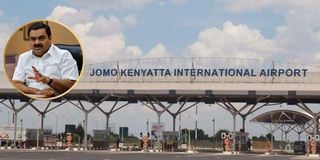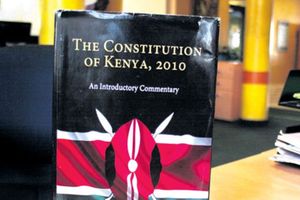
Indian billionaire Gautam Adani (inset).
When I grow up, I will write a book on politics and private-public partnership (PPP) deals in Kenya. The book will also discuss corruption risks associated with PPP projects.
There will be a chapter on PPP projects that stalled because of politics. Here is an example. Just before former President Uhuru Kenyatta left office, there was a big fight within power broking networks in that administration over a proposal to hand over Mombasa Port’s second terminal to a private party under a PPP arrangement.
On one side of the divide was a group proposing that both the Lamu Port and the second container terminal of Mombasa be combined and offered to a single PPP contractor. On the other was a more politically powerful group with a different proposal that ran as follows. First, we hand over the State owned Kenya National Shipping Line to Mersk Shipping Lines. Subsequently, we gift the second container terminal to an international shipping line under a 30-year concession. This PPP transaction stalled due to infighting among the political gatekeepers of the Kenyatta regime.
The second chapter of the book I plan to write will be titled “How PPP projects can be deliberately designed to create kick-back opportunities for rent- seeking elites”. This chapter will discuss the infamous local shareholding threshold rule and how greedy elites exploit it to acquire shares and interest in concessioned or privatised companies on the cheap. This rule is how greedy elites under Moi ended up owning that infamous company known as Mobitelea. This rule is stipulated in law—Section 59 of the PPP Act.
Expressway
The third chapter of my book will run under the following title: How loss of political influence by middlemen backing a PPP investor can stall a PPP deal.
Two power broking networks were at each other’s neck battling for opportunity to patronise the Sh160 billion Nairobi-Nakuru-Mau Summit PPP project.
This was not to be a normal toll project as in the Expressway where the PPP contractor builds the road and collects the money from road users to recover his costs for a period of 30 years. It was to be an availability contract—the government collects the toll fees and pays a fixed sum to the PPP contractor. In other words, the contractor does not carry traffic risks.
We are told that this PPP project collapsed because the government discovered that the contractor’s financial model would lead to inordinately high toll fees. But the truth of the matter is that loss of political influence and patronage was also a big factor.
The fourth chapter of my book will be titled “PPP projects where negotiations collapsed because of disagreements over the financial model proposed by the contractor”.
One of America’s largest construction companies, Bechtel Corporation, presented a privately-initiated proposal (PIP) to the government to build the Nairobi Mombasa Express Highway. Negotiations immediately commenced, leading to the signing of a commercial agreement with the Kenya National Highway Authority. Environmental impact assessment studies and public participation sessions were concluded.
Infrastructure projects
The Americans proposed that we go through the conventional route of financing infrastructure projects, namely, guarantee against the government books from Exim banks and borrowing from international debt markets. The National Treasury disagreed and asked the Americans to build the road with their own money and recover the money from road tolls. That PPP deal collapsed.
The Olkaria 140MW geothermal PPP deal was abruptly cancelled just before Mr Kenyatta left office after a long procurement process, including multiple investor conferences. In PPP circles, the open secret is that this deal stalled because insiders realised that the party that was scoring high marks in the tender evaluation stages and in pole position was not well aligned politically with the power brokers under the Kenyatta regime.
Just the other day, a British company, GBM, was in the advanced stages of concluding a PPP project after presenting a PIP to build the High Grand Multipurpose Dam on the Tana. Observers were surprised when that project was the subject of separate discussions between President William Ruto and a senior advisor of EDF of France when the President visited France in January last year.
In the case of the Ketraco and the Adani PPP deal, we are asking the Indian investor to build the transmission lines with its own money and to recover what they have spent by charging the consumer. If the deal must go through, we must make sure that we negotiate their costs down.
Inordinately high equity costs, borrowing costs and most important, engineering, procurement and construction costs, is how we allowed the independent power producers to saddle the electricity consumer with a regime of permanently rising prices.













